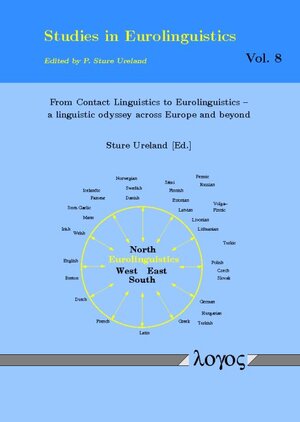
×
![Buchcover ISBN 9783832534363]()
From Contact Linguistics to Eurolinguistics
A linguistic odyssey across Europe and beyond
herausgegeben von Sture UrelandThe 21 articles in this book were presented in workshops by { small ELA in Lisbon (Sept. 2009), Moscow (June 2010) and Rome (May 2011). The five chapters are divided into various aspects of general and Europewide Eurolinguistics: Chapter I contains articles written by Schmitt, Broderick, Krasukhin, Kremer, Fu 3 and Socanac. Then, in Chapter II, a completely new view of { small TRANS- EURASIAN languages is presented by Robbeets. She compares typologically, structurally and historically TRANS-EURASIAN languages (Japanic, Koreanic, Tungusic, Mongolic and Turkic) in the past and the present, claiming linguistic similarities between them: { small TRANS-EURASIAN LANGUAGES. Also Broderick summaries in his contribution the { small EURAFRICAN contacts since the 1890s up to our own millennium and reaches also a scope beyond the European horizon in the south as Robbeets does in the east.
In Chapters III and IV following the major European outline, Piirainen and Kiso deal with the surprisingly similar parallels of phraseological figurative units within Europe and beyond which are seen as the result of inner-European contacts, but also those beyond Europe in a { small TRANS-EURASIAN perspective which is stressed especially by Piirainen. Also in dealing with European lexicography and semantics, Schmitt, Merolle and Otto continue with a great number of lexical and semantic similarities and convergences explainable only in the framework of contacts, between European languages and beyond Europe in the past and the present. The complicated language of law for special purposes (Fachsprache) in all European languages is discussed by Geisler. Then the possibility of creating an inter-European language (European) from reconstructed similarities between the three major linguistic branches of the European languages (LSJ) is presented by Steller. Finally, in Chapter V, the teaching and acquisition helpers are discussed by Ferrarotti/Castorina, Cucco-Robbiolio and Ureland.
In Chapters III and IV following the major European outline, Piirainen and Kiso deal with the surprisingly similar parallels of phraseological figurative units within Europe and beyond which are seen as the result of inner-European contacts, but also those beyond Europe in a { small TRANS-EURASIAN perspective which is stressed especially by Piirainen. Also in dealing with European lexicography and semantics, Schmitt, Merolle and Otto continue with a great number of lexical and semantic similarities and convergences explainable only in the framework of contacts, between European languages and beyond Europe in the past and the present. The complicated language of law for special purposes (Fachsprache) in all European languages is discussed by Geisler. Then the possibility of creating an inter-European language (European) from reconstructed similarities between the three major linguistic branches of the European languages (LSJ) is presented by Steller. Finally, in Chapter V, the teaching and acquisition helpers are discussed by Ferrarotti/Castorina, Cucco-Robbiolio and Ureland.


